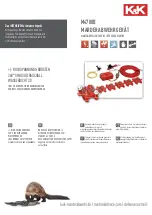
Page 28
WS1CC & WS1.25CC Manual
Installation Fitting Assemblies
The installation fi ttings connect to the control valve or the bypass valve using nuts that only require hand tightening. Hand tighten
nut connections between control valve and installation fi ttings, control valve and bypass valve, and bypass valve and installation
fi ttings allow for easy serviceability. Do not use a pipe wrench to tighten nuts on installation fi ttings. Hand tighten only.
The split ring retainer design holds the nut on and allows load to be spread over the entire nut surface area, reducing the chance for
leakage. The split ring design, incorporated into the installation fi ttings allows approximately 2 degrees off axis alignment to the
plumbing system. The installation fi ttings are designed to accommodate minor plumbing misalignments but are not designed to
support the weight of a system or the plumbing.
When assembling the installation fi tting package, connect the fi tting to the plumbing system fi rst and then attach the nut, split ring
and o-ring. Heat from soldering or solvent cements may damage the nut, split ring or o-ring. Solder joints should be cool and solvent
cements should be set before installing the nut, split ring and o-ring. Avoid getting primer and solvent cement on any part of the o-
rings, split rings, bypass valve or control valve. Solvent cements and primers should be used in accordance with the manufacturer’s
instructions.
Slip the nut onto the fi tting fi rst, then the split ring second and the o-ring last. Hand tighten the nut. If the fi tting is leaking tightening
the nut will not stop the leak. Remove the nut, remove the fi tting, and check for damage or misalignment of the o-ring.
Do not use pipe dope or other sealant on threads.
Use tefl on tape on threaded inlet, outlet and drain fi ttings.
Tefl on tape is not
necessary on the nut connection or caps because of o-ring seals.
Do not use Vaseline, oils, or other unacceptable lubricants on o-rings. A silicone lubricant may be used on black o-rings.
Bypass Valve
The bypass valve easily connects to the control valve body using nuts that only require hand tightening. Hand tighten nut
connections between control valve and fi ttings, control valve and bypass valve, and bypass valve and installation fi ttings allow
for easy serviceability. The split ring retainer design holds the nut on and allows load to be spread over the entire nut surface
area, reducing the chance for leakage. The split ring design incorporated into the bypass allows approximately 2 degrees off axis
alignment to the plumbing system. The bypass is designed to accommodate minor plumbing misalignments but is not designed to
support the weight of a system or the plumbing.
Avoid getting primer and solvent cements on any part of the o-rings or split rings, bypass valve or control valve. Do not use pipe
dope or other sealant on threads. Tefl on tape is not necessary on the caps because of o-ring seals.
Do not use Vaseline, oils, or other unacceptable lubricants on o-rings. A silicone lubricant may be used on black o-rings.
Mixing Valve
The mixing valve is an option on the control valve. If the control valve is ordered with a mixing valve it will be installed in the
control valve assembly process.
To adjust the blended water, close the mixing valve. Open a water faucet to the desired fl ow rate. Open the mixing valve until the
desired hardness is reached. Close the faucet.
Note: The use of the mixing valve requires modifi cation to the valve body. These modifi cations should not be done in the fi eld.
Summary of Contents for WS1CC
Page 2: ......
Page 13: ...WS1CC WS1 25CC Manual Page 13 Figure 3 Figure 4 Figure 1 Figure 2...
Page 29: ...WS1CC WS1 25CC Manual Page 29 Drawings and Part Numbers...
Page 41: ...WS1CC WS1 25CC Manual Page 41 Flow Diagrams Service and Backwash...
Page 42: ...Page 42 WS1CC WS1 25CC Manual Flow Diagrams Downflow and Upflow WS1CC Only...
Page 43: ...WS1CC WS1 25CC Manual Page 43 Flow Diagrams Rinse and Fill...
Page 53: ...WS1CC WS1 25CC Manual Page 53...
Page 54: ...Page 54 WS1CC WS1 25CC Manual...
Page 55: ...WS1CC WS1 25CC Manual Page 55...
Page 56: ...Page 56 WS1CC WS1 25CC Manual...
Page 57: ...WS1CC WS1 25CC Manual Page 57...
Page 58: ...Page 58 WS1CC WS1 25CC Manual...
Page 59: ...WS1CC WS1 25CC Manual Page 59...
















































